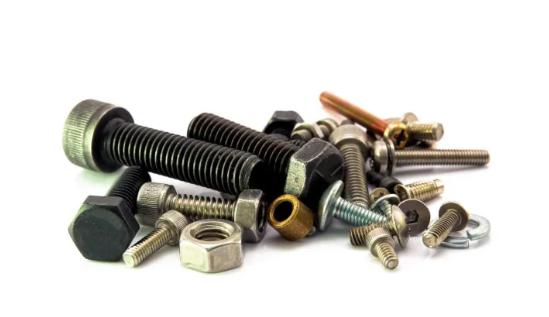Comparison of Fastener Durability by Material
In industrial applications, fasteners serve as key components for connecting and securing parts, and their durability is crucial. High-quality fasteners maintain the structural integrity of equipment over long periods, reducing early failures due to fatigue. This lowers machine replacement frequency, reduces maintenance costs, and improves assembly efficiency. Choosing the right fasteners not only ensures reliability and safety but also impacts overall manufacturing efficiency and economic performance.
Different factors affect fastener durability, including the material properties, operating environment, stress conditions, and whether proper surface treatments are applied. As a professional fastener manufacturer, Xinchi is happy to share a detailed comparison of durability across various fastener materials.

Stainless Steel Fasteners: Corrosion-Resistant and Durable
Stainless steel fasteners are known for their excellent corrosion resistance, strength, and aesthetic appeal, making them a reliable choice in many industrial applications.
- Corrosion Resistance: Ideal for humid or corrosive environments; maintains durability over long periods.
- Strength and Toughness: Can withstand moderate loads and stress changes while keeping connections secure.
- Aesthetic Appeal: Smooth surface finish; suitable for applications where appearance is important.
- Applications: Chemical, pharmaceutical, food processing industries, high-end machinery, and precision instruments.
Carbon Steel Fasteners: High Strength with Cost Efficiency
Carbon steel fasteners offer high strength and wear resistance, but require protection against corrosion.
- Strength and Hardness: Suitable for high-load applications.
- Wear Resistance: Resists moderate abrasion.
- Corrosion Resistance: Poor; prone to rust without protective coatings.
- Applications: General machinery and industrial equipment, especially in cost-sensitive applications with high strength requirements.
Alloy Steel Fasteners: High Strength and Corrosion Resistance
Alloy steel fasteners combine enhanced strength and corrosion resistance through elements like chromium and molybdenum.
- High Strength & Corrosion Resistance: Suitable for high-pressure, high-temperature, and heavy-duty applications.
- Wear Resistance: Maintains performance under long-term wear.
- Applications: Aerospace, automotive, heavy machinery, and other fields requiring high strength and durability.
Brass Fasteners: Conductive and Moderate Corrosion Resistance
Brass fasteners offer good corrosion resistance and excellent electrical and thermal conductivity, but have lower strength than steel fasteners.
- Corrosion Resistance: Moderate; less than stainless steel, vulnerable in harsh environments.
- Conductivity: Excellent for electrical or thermal applications.
- Strength: Relatively low.
- Applications: Low-corrosion environments, such as clocks, pipes, and valves.
Aluminum Alloy Fasteners: Lightweight and Moderate Durability
Aluminum alloy fasteners are lightweight and strong, ideal for applications where reducing weight is important.
- Corrosion Resistance: Moderate; can be improved with anodization.
- Lightweight & High Strength: Reduces overall structural weight.
- Durability: Influenced by environmental conditions; may deform under high temperature or humidity.
- Applications: Aerospace, automotive, construction, electronics.
Titanium Alloy Fasteners: High-Performance for Extreme Conditions
Titanium alloy fasteners offer exceptional strength, corrosion resistance, and light weight, suitable for extreme and high-tech applications.
- Strength & Corrosion Resistance: Performs reliably in high/low temperatures, high pressure, and strong magnetic fields.
- Lightweight: Ideal for weight-sensitive applications.
- Non-Magnetic: Suitable for environments where magnetic interference must be avoided.
- Applications: Aerospace, nuclear, electronics, medical devices, and artificial organs.
Choosing the Right Fastener Material
Different fastener materials have distinct characteristics. Selection should consider environment, stress, and cost:
- Corrosive or humid environments: Stainless steel and titanium alloy fasteners are optimal.
- Weight-sensitive applications: Aluminum alloy fasteners are advantageous.
- High strength or wear resistance needs: Alloy steel and carbon steel are preferred.
Selecting the right fasteners ensures equipment reliability, extends service life, and reduces maintenance costs, supporting efficient and safe industrial production.

XINCHI is a trustworthy fastener company, especially in furniture nuts. We have a factory that was founded in 2007. We are the designated fastener supplier to“STAPLE”. As a trusted fastener supplier, XINCHI offers a wide range of high-quality fasteners, including nuts, screws, bolts, rivets, and washers. Our products are widely used in automotive, machinery, construction, electronics, and furniture industries, trusted by global customers for stability, precision, and durability.

